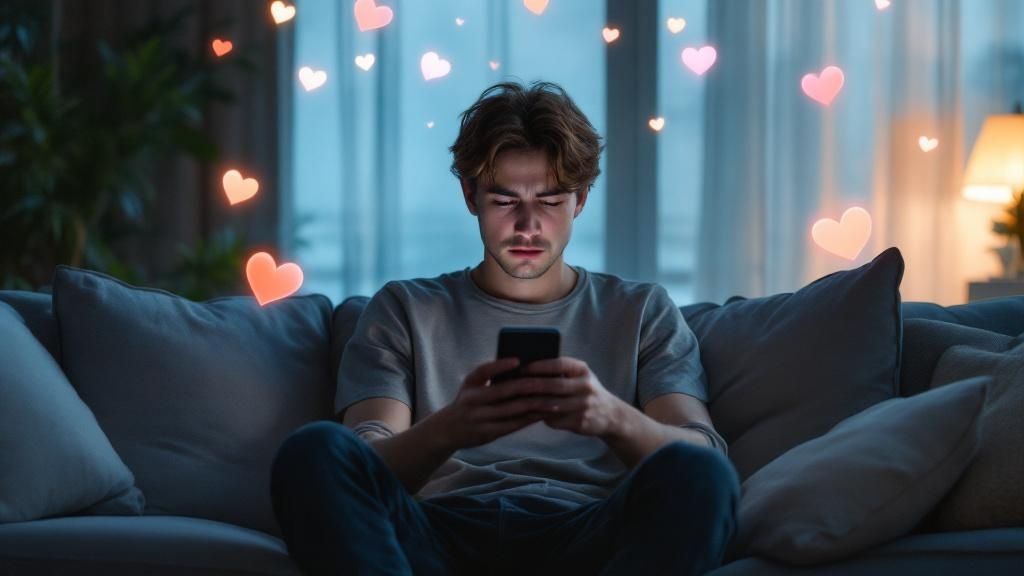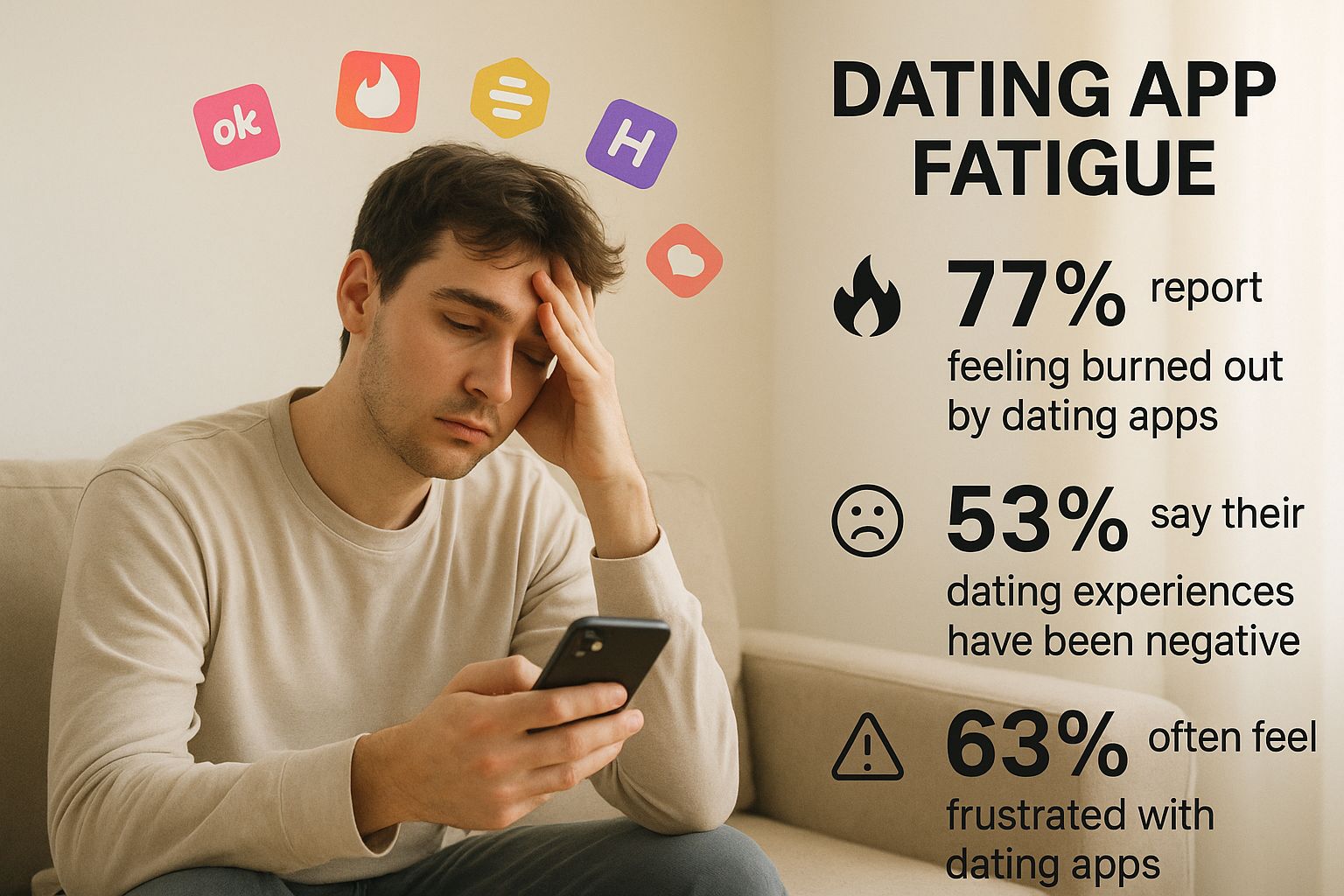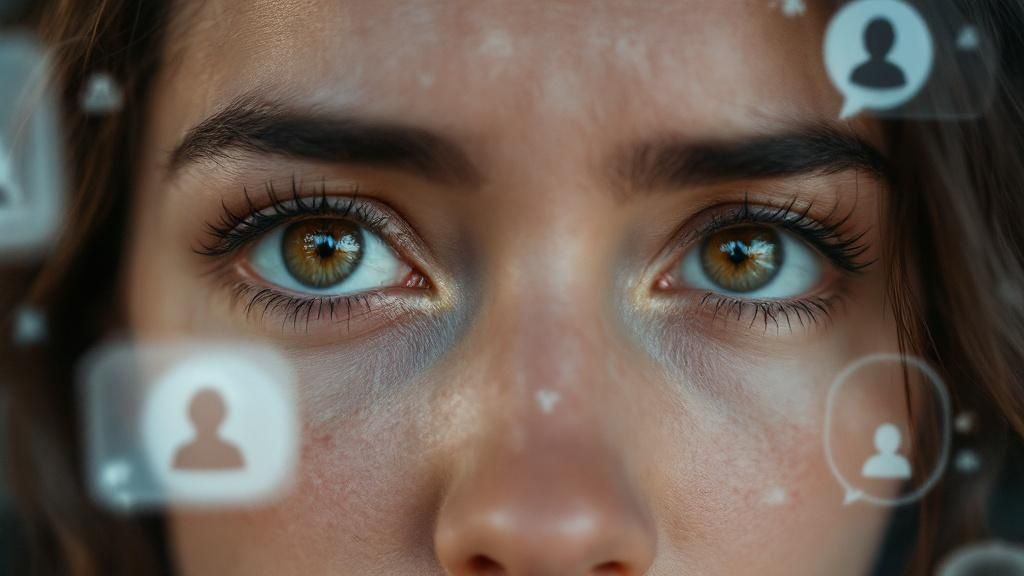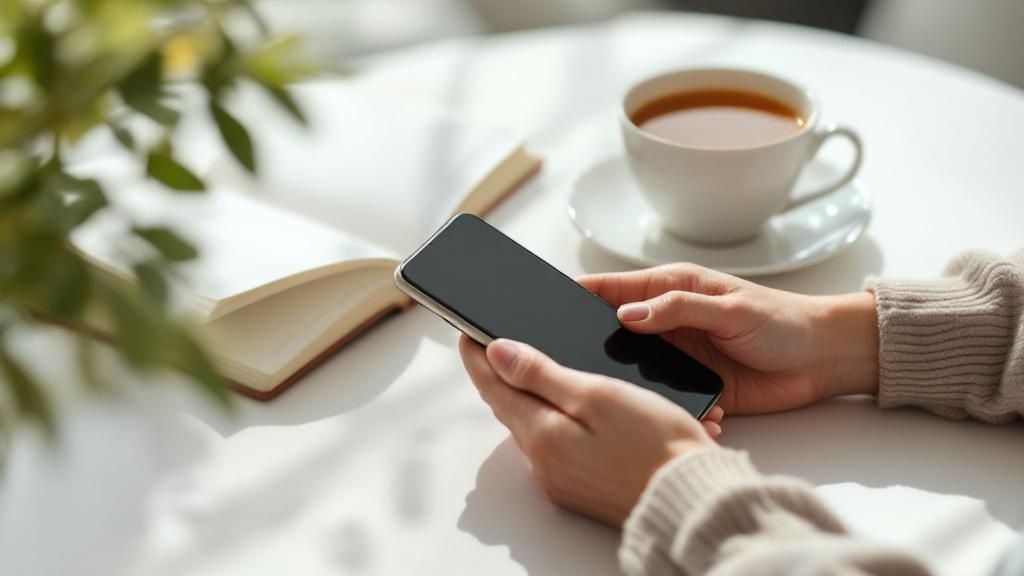Create Your Own AI Girlfriend 😈
Chat with AI Luvr's today or make your own! Receive images, audio messages, and much more! 🔥
4.5 stars

If you've ever felt like using a dating app is more of a soul-crushing chore than an exciting path to romance, you’re not alone. What you're feeling has a name: dating app fatigue. It’s that deep sense of emotional and mental exhaustion that builds up from the relentless cycle of swiping, matching, and messaging—often with very few meaningful connections to show for it.
This burnout can sneak up on you, turning what should be a hopeful search for a partner into a frustrating, repetitive job you don't even get paid for.
What Is Dating App Fatigue and Why Is It So Common?
Picture this: you're standing in the cereal aisle of a massive supermarket. There are hundreds of colorful boxes staring back at you, each one promising to be the best. Instead of feeling excited by all the options, you're paralyzed. You start to wonder if the perfect choice is just one more box down the aisle, so you keep looking, and looking, and looking.
That feeling of being overwhelmed by choice is the very essence of dating app fatigue. It’s the burnout that happens when we’re presented with a seemingly infinite number of potential partners but very little genuine substance.
This isn't just a vague feeling; it's a real and widespread phenomenon. The sheer volume of profiles and the rapid-fire, almost gamified nature of swiping create the perfect storm for exhaustion. This image perfectly captures that feeling of being overwhelmed in the pursuit of connection.

As the image shows, the technology that was designed to bring us closer together can often leave us feeling more isolated and drained than ever before.
To help you pinpoint if this is what you're going through, let's break down the common signs. The table below outlines the key symptoms of dating app fatigue, what they look like, and how they might show up in your day-to-day life.
Key Symptoms of Dating App Fatigue
| Symptom | Description | Example |
|---|---|---|
| Endless Swiping | Mindlessly browsing profiles for hours without any real engagement or excitement. | "I spent an hour swiping on my lunch break and can't remember a single person I saw." |
| Emotional Exhaustion | Feeling mentally drained, cynical, or pessimistic about dating after using an app. | "The thought of starting another 'hey, how are you?' conversation just makes me tired." |
| Increased Irritability | Becoming easily annoyed by the app, matches, or the entire process of online dating. | "I get so frustrated when a match doesn't reply within a few hours that I just want to delete the app." |
| Detachment | Treating profiles as commodities to be sorted rather than as real human beings. | "I swipe left on anyone who uses a fish pic, no questions asked. It's just faster." |
| Lowered Self-Esteem | Feeling rejected or inadequate due to a lack of matches or meaningful conversations. | "After getting no replies this week, I'm starting to wonder what's wrong with my profile... or with me." |
Recognizing these symptoms is the first step. If you see yourself in this table, it's a clear sign that the way you're approaching digital dating isn't working for your well-being.
The Numbers Behind the Burnout
That worn-out feeling isn't just in your head—the data backs it up. This isn't some niche issue; it's a nearly universal experience for anyone trying to find love online. In fact, studies show that over 79% of adults have felt some degree of exhaustion from their time on digital dating platforms.
This fatigue hits younger generations particularly hard. A staggering 80% of Millennials and 79% of Gen Z users admit to feeling burned out. The platforms themselves are a big part of the problem. Take Tinder, for example. It has been downloaded more than 630 million times, flooding the dating pool with an overwhelming number of profiles and promoting a culture of snap judgments. Most people spend less than seven seconds looking at a profile, which makes the whole thing feel less like a search for a partner and more like a high-speed assembly line. You can find more insights on dating app trends and see just how deeply this affects users.
The Cycle of Hope and Disappointment
At its core, dating app fatigue is fueled by a tough, repetitive cycle that slowly grinds you down. It’s a constant loop of high hopes crashing into low-reward, forgettable interactions.
Here’s what that cycle usually looks like:
- The Fresh Start: You download an app, feeling optimistic and genuinely ready to meet someone great.
- The Swiping Grind: Soon, you're spending hours swiping through an endless stream of profiles, making split-second decisions based on a few photos and a short bio.
- The Hollow Match: You finally get a match! But the conversation is painfully generic ("hey," "wyd?"), one-sided, or fizzles out before it even gets started.
- The Emotional Toll: After a few rounds of ghosting, dealing with potential catfishing, or just realizing you have zero in common with your matches, you feel defeated and dejected.
This constant churn demands a huge emotional investment for very little in return. It's this imbalance that ultimately leads to the cynicism and exhaustion that define dating app fatigue, turning what should be an exciting adventure into a demoralizing slog.
What’s Happening in Your Brain When You Swipe?
Have you ever felt completely drained after a session on a dating app? It’s a common feeling, and it’s not your fault. The exhaustion you're experiencing is a completely normal reaction to a system that’s designed more like a casino game than a matchmaking service. Your dating app fatigue isn't a sign of personal failure; it's a predictable outcome of how these apps interact with our human psychology.
It really boils down to something called the paradox of choice. On the surface, having thousands of potential dates in your pocket seems like a huge advantage. But in reality, our brains just aren't wired to handle that much information. When we're flooded with endless options, we don't feel empowered—we feel paralyzed.
This overload triggers a constant, nagging anxiety. You start second-guessing every decision, always wondering if a slightly better person is just one more swipe away. Instead of feeling confident about a choice, you end up feeling dissatisfied and stuck.
The Slot Machine in Your Pocket
Dating apps are experts at making the search for love feel like a game. Every swipe, every new match notification, every "like" is engineered to give your brain a little jolt of pleasure. This is your brain's reward system at work, releasing a chemical called dopamine that makes you feel good and want to keep going.
This system relies on intermittent reinforcement—the same powerful principle that gets people hooked on slot machines. You don't know when the next reward (a match) will pop up, so you keep swiping in anticipation. It’s this unpredictable cycle that keeps you coming back for more, even when the overall experience leaves you feeling empty and burned out.
Think about it: our brains didn't evolve to judge hundreds of potential life partners in a 30-minute sitting. That constant mental effort of swiping, analyzing, and deciding leads to serious decision fatigue. It wears you down to the point where you might not even recognize a genuinely great person when they do show up.
The High Cost of Low-Effort Dating
It’s not just the swiping that drains you; the way we communicate on these apps takes a huge emotional toll. The screen creates a buffer that makes it easy for people to engage in hurtful behaviors like ghosting or breadcrumbing, which can feel intensely personal.
This is how these all-too-common experiences feed your dating fatigue:
- Shallow Chats: Most conversations are stuck in a loop of "Hey, what's up?" This kind of repetitive, surface-level small talk feels more like a tedious chore than the start of a real connection.
- The Sting of Rejection: Being unmatched, ignored, or left on read might seem small, but these micro-rejections add up. Over time, they can seriously chip away at your confidence and self-worth.
- The Ghosting Effect: When a promising conversation just vanishes into thin air, it’s confusing and painful. It's natural to be left wondering what you did wrong, even when it has nothing to do with you.
All these small, negative emotional hits accumulate, leaving you feeling completely spent. Your fatigue is a perfectly valid response to an environment that asks for constant vulnerability but offers very little genuine connection or emotional safety in return. The good news is, once you understand these psychological traps, you can start to find healthier ways to date.
Are People Actually Quitting Dating Apps?

With all the talk about burnout, you'd think there's a mass exodus happening from dating apps. We all have friends who've dramatically deleted their profiles, and headlines constantly scream about how disillusioned everyone is.
But when you dig into the actual data, the story isn't that simple. It’s far more interesting.
The reality is, people aren't quitting dating apps in the droves we imagine. We're caught in a classic love-hate relationship. Dating app fatigue is absolutely a real, widespread feeling, yet these platforms are more popular and ingrained in our social lives than ever.
This paradox points to a fundamental human emotion that often overpowers all the daily frustrations: hope. For so many singles, the chance of finding "the one" with the very next swipe is just too compelling to give up on, no matter how draining the process gets.
The Numbers Tell a Different Story
Despite the doom-and-gloom narrative, dating app engagement is surprisingly strong. The online conversation isn't just about quitting; it's a nonstop, lively discussion about the entire experience. If anything, the sheer volume of chatter shows people are more invested than ever, not less.
Between April 2024 and April 2025, social media lit up with over 4.64 million mentions of online dating and apps. That breaks down to about 12,700 mentions every single day. This points to sustained, intense interest, not a mass departure.
The money tells a similar story. Apps like Tinder and Bumble are consistently in the top 10 mobile apps worldwide for consumer spending. People aren't just swiping; they're paying for premium features to improve their odds. This financial commitment shows just how much we rely on these platforms to find relationships. You can explore more data on this ongoing engagement to see just how active the conversation really is.
Why Do We Stay Despite the Fatigue?
So, if everyone feels so burnt out, why are we all still here? The answer is a potent mix of modern convenience and timeless human desire. For better or worse, these apps often feel like the most practical way to meet people beyond our immediate social circles.
Here’s a breakdown of why we stick with it:
- The Promise of Possibility: Each new profile is a lottery ticket. It holds the potential for a connection that could change your life, and that glimmer of hope keeps us swiping through the exhaustion.
- Unmatched Convenience: Apps let you "date" from your couch, on your lunch break, or while waiting in line for coffee. They fit into our chaotic lives in a way that meeting people organically sometimes can't.
- It's Become the Norm: In many social scenes, being on a dating app is the default. If you’re not on one, it can feel like you've completely opted out of the dating game.
Ultimately, the problem isn't a lack of users. It’s a collective cry for a better, more meaningful way to connect. People don't really want to quit—they're just desperate for healthier strategies and smarter tools to navigate modern dating without burning out.
If you're feeling drained by the endless scroll, that's your cue to switch up your strategy—not to abandon dating altogether. It's about taking back the reins from the algorithm. The key is to build intentional habits that turn these apps from a source of stress back into a helpful tool. By setting some clear boundaries, you can protect your energy and zero in on what really counts.
These aren't "hacks" or tricks to game the system. Think of it more like building a healthier relationship with the technology you're using. The goal is to make the whole process more mindful, cutting through the mental noise and emotional exhaustion that leads straight to burnout.
https://www.youtube.com/embed/VMbhM59K5FQ
Set Firm Boundaries and Time Limits
The very first step is to stop letting dating apps run your life. Instead of picking up your phone and swiping out of habit whenever you have a spare minute, start treating your app time like any other appointment in your calendar. This deliberate approach stops the mindless scrolling that eats away at your mental battery.
Try putting these simple but powerful limits in place:
- Schedule Your Swipes: Set aside a specific 15-20 minute block of time each day for the apps. Once your timer goes off, close the app. Seriously. Don’t open it again until your next scheduled slot.
- Kill the Notifications: Those constant pings for new matches and messages keep you in a state of anxious waiting. Turning them off puts you firmly back in the driver's seat, letting you engage when you decide to.
- Take "App-Free" Days: Pick one or two days a week to go completely app-free. This gives your brain a chance to breathe and helps you hit the reset button emotionally.
Optimize Your Profile for Quality, Not Quantity
Let’s be honest: a generic profile pulls in generic matches, which leads to the same tired, dead-end conversations that fuel dating app fatigue. Stop trying to be everything to everyone. Instead, sharpen your profile to attract the right kind of person for you. That means getting specific, being unapologetically you, and stating clearly who you are and what you’re looking for.
Think of your profile as your first line of defense—a filter. A great one weeds out the mismatches before you ever waste a swipe, saving you an incredible amount of time and emotional energy.
A well-crafted profile is your best defense against burnout. It shifts your focus from chasing a high volume of matches to attracting a small number of high-quality connections, making every interaction more likely to be meaningful.
This is more important than ever. In the United States, nearly 30% of adults are on dating apps, and younger users, in particular, are feeling the sting of all these impersonal interactions. The convenience is there, sure, but the endless carousel of faces can ironically make you feel more lonely and dissatisfied. As experts on Psychology Today point out, it's about balancing our digital and real-world lives to fight that fatigue.
Engage with Intention and Purpose
Once your boundaries are set and your profile is sharp, the final piece of the puzzle is changing how you actually talk to people. It's time to step away from the numbers game and lead with genuine curiosity. Rather than swiping on a hundred profiles, pick just a few that really catch your eye and take a moment to actually read them.
When you do start a conversation, ask a question about something specific in their bio or photos. It shows you're paying attention. This little bit of effort can spark much more interesting chats and help you figure out if there's a real vibe there, fast. If you're looking for more tips on making your conversations pop, you might want to check out our guides on how to improve your dating app experience. This small shift in mindset can make dating feel less like a chore and more like an actual opportunity for human connection.
Exploring Alternatives Beyond the Swipe
If you're tired of the endless cycle of swiping, matching, and then watching conversations fizzle out, you're not alone. That feeling of being completely drained is real, but overcoming dating app fatigue doesn't mean you have to give up on finding someone special. It just means it's time to change your strategy.
Sometimes, the best move is to step away from the screen altogether. Getting back to in-person connections can be a fantastic way to reset your expectations and rebuild your social confidence in a more natural setting.
Reconnecting with the Real World
Meeting people organically isn't some lost art from a bygone era. It’s simply about putting yourself in situations where you can connect over shared interests, which takes all the pressure off. Think about it: you get to meet new people while doing things you already love.
Here are a few low-pressure ideas to get you started:
- Join Social or Hobby Clubs: Find a local hiking group, a book club, or even a board game league. When you connect with people over a shared passion, the conversation flows easily. It’s a connection built on a real activity, not just a profile picture.
- Volunteer for a Cause You Believe In: Working alongside someone for a good cause shows you their character in a way a short bio never could. It’s a powerful way to connect on a deeper level.
- Take a Class: Have you always wanted to learn pottery, master Italian cooking, or speak a new language? Signing up for a workshop is a brilliant way to develop a new skill and meet interesting people at the same time.
The point here isn't to go "hunting" for a partner. It's about refilling your social battery and reminding yourself that interesting, single people are all around you—not just behind a screen. This simple shift in mindset is one of the best antidotes to dating fatigue.
Embracing Next-Generation Dating Solutions
While there's immense value in real-world connections, technology is also getting smarter. A new wave of dating platforms is being designed specifically to fight the burnout that older apps created. These tools feel less like an overwhelming catalog of faces and more like a personal dating assistant.
One of the most interesting developments is the use of AI to create a more focused and less demanding experience. Take a platform like Luvr AI; it’s built to do the heavy lifting for you. Instead of leaving you to swipe through hundreds of profiles, the system learns what you’re looking for and introduces you to a small, handpicked selection of highly compatible matches.
This screenshot gives you a glimpse of how these newer platforms are moving away from the endless swipe model toward a more guided and personalized interface.

This kind of approach puts quality squarely ahead of quantity, which is a direct answer to the decision paralysis and emotional exhaustion that define dating app fatigue. If you're curious about how these new tools are shaking things up, you can find more insights on our dating blog.
By balancing offline activities with smarter online tools, you can create a dating strategy that feels healthier, more effective, and a whole lot less exhausting.
Frequently Asked Questions About Dating App Fatigue
Even when you know what dating app fatigue is, it’s completely normal to have some questions left over. You might be wondering about the emotional toll or what you should actually do next. Let's tackle some of the most common concerns to help you get your head straight and find a healthier way to date.
Is It Normal to Feel Worse About Myself After Using Dating Apps?
Absolutely. It’s incredibly common to feel your self-esteem take a hit, and you're not alone in that. Think about it: dating apps boil people down to a single photo and a split-second decision. It’s a process that can feel deeply impersonal and, frankly, a little dehumanizing.
When you’re constantly scrolling through profiles that look like a highlight reel of someone else’s life, it's almost impossible not to start comparing. You start to internalize the negative stuff—getting ghosted, unmatched, or just hearing crickets after sending a message. Soon enough, you're questioning your own value. Remember, this feeling is a symptom of dating app fatigue, not a true measure of who you are. Your worth isn't decided by an algorithm.
How Can I Differentiate Burnout from General Dating Discouragement?
Dating has always had its frustrations. A bad date or the feeling that you've met every single person in your city can be discouraging. But the burnout you get from apps feels different because it’s tied directly to the technology itself.
Ask yourself a few honest questions:
- Do you get a little knot in your stomach when you see the app icon on your phone?
- Does the act of swiping feel more like a mindless chore than an exciting prospect?
- Is it the overwhelming number of profiles and chats, rather than a lack of dates, that’s draining you?
If your exhaustion stems from the digital grind—the endless swiping and superficial chats—then you’re almost certainly dealing with dating app fatigue.
The core difference is the source of the frustration. Discouragement is about the outcome of dating, while fatigue is about the process of using the app itself. Recognizing this helps you target the right problem.
Will Taking a Break from Apps Make Me Miss Out?
That fear of missing out (or "dating FOMO") is a real and powerful feeling. It’s what keeps so many of us logged in and swiping long after the fun has faded. But here’s the thing: pushing through when you’re already exhausted is usually a waste of time. You’re not showing up as your best self, your conversations will feel flat, and you won’t have the energy for a genuinely good first date anyway.
Think of a break not as quitting, but as a strategic reset. It’s your chance to recharge your emotional batteries. When you decide to come back, you'll be able to do it with a fresh perspective and real intention. Plus, taking a step back opens up your time and mental energy to meet people in the real world—a pretty great alternative. Even new technologies are finding ways around this; you can learn more about how AI chatbots are changing the dating conversation to be far less draining.
Ready to move beyond the swipe and explore a new way to connect? Luvr AI offers an immersive experience where you can interact with lifelike AI characters in scenarios you control. Build genuine connections without the pressure and fatigue of traditional dating apps. Discover your ideal companion today at Luvr AI.



